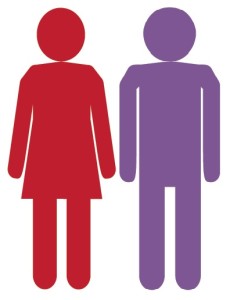This ludicrous obsession, parents in Parliament: the motherhood trap
The adoption of All-Women Short-lists by Labour and a concerted effort across both main parties to get more women into the House of Commons have had achieved notable gains for the presence of women in public life. Despite this, men still outnumber women four to one on the green benches. However the focus on headline gender masks a different, but strongly related problem, which is that those with caring responsibilities – most often mothers – face serious barriers in being elected to Parliament, something which Rosie Campbell and Sarah Childs argue needs to change.

Can the yellow, blue and red teams do more to get more mothers into Parliament? (Credit: garryknight, CC by 2.0)
Men’s over-representation and women’s under-representation in the UK Parliament is pretty well known, even if the public sometimes over-estimates just how many women MPs there are, bedazzled by their bright clothing in the Chamber. In fact, men outnumber women by more than 4:1.
Some people may not find this particularly troublesome. Lord Hurd has recently been cited saying that there is a “ludicrous” obsession with ensuring there is equal representation of men and woman in parliament and other areas of public life. We believe very strongly that a diversity of background and experience does matter. And there’s another serious flaw with the Hurd line of reasoning. He says that if voters didn’t want a “good looking chap from a public school” as prime minister they wouldn’t keep choosing them.
But the reason feminists have campaigned for All Women Short-lists as a means to get more women at Westminster is precisely because it’s political parties not voters who choose our candidates and party leaders. We the voters don’t get to choose our parliamentary candidates, and therefore who our MPs, are. The reasons there are too few women in politics stems from both a lack of demand for and supply of women candidates: voters don’t punish women candidates. But in the absence of equality measures such as Labour’s All Women’s Shortlists, parties are much less likely to select women in winnable seats, even if fewer women seek selection as parliamentary candidates overall.
Having children is frequently cited as a barrier that holds women back from seeking parliamentary selection. But of course not all women are mothers. And both men and women are parents. So we need to question whether the problem is less about the equal representation of men and women – or parents and non-parents – and perhaps more about the exclusion of mothers?
Until now, the UK Parliament simply did not know how many mothers or fathers sat on its green benches. During the new Labour years, and again since 2010, a number of women MPs have given birth: the latest being the Liberal Democrat Minister Jo Swinson, who is currently facing criticism for wanting to have her child with her in the division lobby. We doubt that the vocal hostility to the needs of a new mother, that her comments have generated, are likely to increase the supply of mothers seeking selection for the 2015 general election.
In our survey of MPs in 2012 we found a startling set of facts about mothers and fathers in Parliament;
- 45% of women MPs have no children, compared to 28% of male MPs, and compared to an average of about 20% of the population who remain childless
- Of all MPs with children, male MPs have on average 1.9 children, whilst women MPs have on average only 1.2
- The average age of women MPs’ eldest child, when they first entered parliament, was 16 years old ; the average age of men MPs’ eldest child when they first entered parliament was 12 years old
In sum: women MPs are;
- less likely to have children than male MPs
- more likely to have fewer children than male MPs, and
- enter parliament when their children are older than the children of male MPs.
These staggering differences are clear evidence that there are serious barriers to Parliament for those with caring responsibilities, most often mothers.
Reactions to these statistics will likely vary depending on whether you believe that the House of Commons should look like the society it represents for reasons of justice; or whether you think that good-looking public school educated men are equally capable of understanding the complexities of juggling work and family life.
There will be those who have no fear that without mothers in Parliament the soaring costs of childcare and the disproportionate effect of the economic crisis on women in low paid and part-time work (mostly mothers) will reach the top of the political agenda. We’re not so sure. And that’s why we want more mothers in Parliament.
—
Note: This post represents the views of the authors and does not give the position of Democratic Audit or the LSE. It also appears on the Huffington Post and can be seen here. Please read our comments policy before commenting. Shortlink for this post: https://buff.ly/1drmGPY
—
 Dr Rosie Campbell is a Senior Lecturer in Politics at Birkbeck, University of London.
Dr Rosie Campbell is a Senior Lecturer in Politics at Birkbeck, University of London.
 Sarah Childs is Professor of Politics and Gender at the University of Bristol
Sarah Childs is Professor of Politics and Gender at the University of Bristol






 Democratic Audit's core funding is provided by the Joseph Rowntree Charitable Trust. Additional funding is provided by the London School of Economics.
Democratic Audit's core funding is provided by the Joseph Rowntree Charitable Trust. Additional funding is provided by the London School of Economics.
Parents in Parliament: the motherhood trap https://t.co/XBzDTAXpoL @democraticaudit
Yup. https://t.co/h9t6wxv7Ze
This ludicrous obsession, parents in Parliament: the motherhood trap : Democratic Audit UK https://t.co/hwfAsc0jd4
‘This ludicrous obsession, parents in Parliament: the motherhood trap’ by @Rosiecampb and @profsarahchilds https://t.co/1aWBWkmMTT
[check out the stats!] MT @democraticaudit: #parents in #Parliament: the #motherhood trap https://t.co/QzJ6mWV0mX
Fab & useful questions asked about gender, caring and (political) careers: https://t.co/u0FoWW7bsy via @PJDunleavy #women #UK #equality
This ludicrous obsession, parents in Parliament: the motherhood trap https://t.co/QpjLWI46yz – by Rosie Campbell and Sarah Childs
This ludicrous obsession, parents in Parliament: the motherhood trap https://t.co/Tn760Qxtca
More mothers in parliament RT“@democraticaudit: This ludicrous obsession, parents in Parliament: the motherhood trap https://t.co/LNJCUG7WsJ”
By @profsarahchilds & @Rosiecampb MT:“@democraticaudit:ludicrous obsession,parents in Parliament:the motherhood trap https://t.co/kpGoMeeQGf”